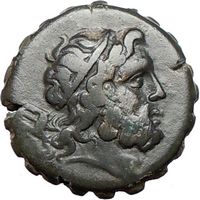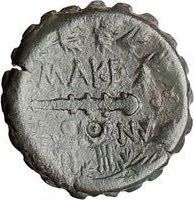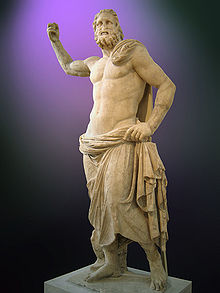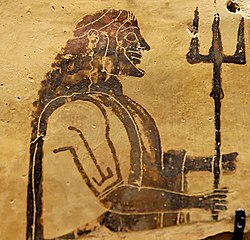Poseidon the Ancient Greek God of the Sea and Mariners Authentic Coins
to Buy from Respected Dealer
Own certified authentic
ancient coins of Poseidon, Ancient Greek God of the Sea. Explore a huge
selection of his ancient
coins and place offers on what you want. Immerse yourself in wonder,
mystery and majesty of the ancient world today. Get the
best deals on ancient coins from www.TrustedCoins.com. All coins come
with a certificate of authenticity and a lifetime
guarantee of authenticity, provided by expert numismatist, dealer and
enthusiast of ancient coins, Ilya Zlobin. You can
explore a selection of other emperor and empress coins by visiting the
chronological list of every emperor and empress of
the Roman empire. Ancient coins make a great gift, investment and a
teaching aid to learning history. It is important to deal
with trusted coin dealers, that is why this is the best place for you to
shop online.


Example of Authentic Ancient
Coin of:
Macedonia Autonomous Issue
Serrate Bronze Struck 185-168 B.C.
under Greek King: Philip V - King of Macedonia: 221-179 B.C.
& Greek King: Perseus - Macedonian King: 179-168 B.C. -
Reference: SNG Copenhagen 1294; Gaebler I pg. 32, 32; AMNG 32
Diademed head of Poseidon right, trident over shoulder.
Club, legend MAKE / ΔONΩN,
and two monograms within oak wreath.
Son of Demetrios II,
Philip V came to power in 221 B.C. on the death of Antigonos Doson. He
was a vigorous ruler and maintained the power of the Macedonian kingdom
in the earlier part of his reign. However, he made the mistake of
arousing the enmity of the Romans, and in 197 B.C. his power was crushed
at the battle of the Kynoskephalai by the Roman general T. Quinctius
Flamininus. After this his power and territory were severely curtailed
by Rome, and the days of the Macedonian kingdom were numbered.
The eldest son of Philip V, Perseus was the last king
of Macedon. He inherited a kingdom already largely dependent on Rome,
but his policies aroused Roman suspicions and armed conflict became
inevitable. At the battle of Pydna, in 168 B.C., Perseus lost his
kingdom and he died two years later as an exile in Italy.
Poseidon or Posidon (Greek:
Ποσειδῶν, gen:
Ποσειδῶνος) is one of the twelve
Olympian deities of the
pantheon in
Greek mythology. His main domain is the
ocean, and he is called the "God of the
Sea". Additionally, he is referred to as "Earth-Shaker" due to his role
in causing
earthquakes, and has been called the
"tamer of horses". He is usually depicted as an older male with curly
hair and beard.
The name of the sea-god
Nethuns in
Etruscan was adopted in Latin for
Neptune in
Roman mythology; both were sea gods
analogous to Poseidon.
Linear B tablets show that Poseidon was
venerated at
Pylos and
Thebes in pre-Olympian
Bronze Age Greece as a chief deity, but
he was integrated into the
Olympian gods as the brother of
Zeus and
Hades. According to some folklore, he
was saved by his mother Rhea, who concealed him among a flock of lambs
and pretended to have given birth to a colt, which was devoured by
Cronos.
There is a
Homeric hymn to Poseidon, who was the
protector of many Hellenic cities, although he lost the contest for
Athens to
Athena. According to the references
from
Plato in his dialogue Timaeus and
Critias, the island of
Atlantis was the chosen domain of
Poseidon.
Etymology
The earliest attested occurrence of the name, written in
Linear B, is Po-se-da-o or
Po-se-da-wo-ne, which correspond to Poseidaōn and
Poseidawonos in
Mycenean Greek; in
Homeric Greek it appears as
Ποσειδάων (Poseidaōn); in
Aeolic as
Ποτειδάων (Poteidaōn); and
in
Doric as
Ποτειδάν (Poteidan),
Ποτειδάων (Poteidaōn), and
Ποτειδᾶς (Poteidas). A
common epithet of Poseidon is Γαιήοχος
Gaiēochos, "Earth-shaker," an epithet which is also identified in
Linear B tablets.
The origins of the name "Poseidon" are unclear. One theory breaks it
down into an element meaning "husband" or "lord" (Greek
πόσις (posis), from
PIE *pótis) and another element
meaning "earth" (δᾶ (da),
Doric for γῆ (gē)),
producing something like lord or spouse of Da, i.e. of the earth;
this would link him with
Demeter, "Earth-mother."[10]
Walter Burkert finds that "the second
element da- remains hopelessly ambiguous" and finds a "husband of
Earth" reading "quite impossible to prove."
Another theory interprets the second element as related to the word *δᾶϝον
dâwon, "water"; this would make *Posei-dawōn into the
master of waters. There is also the possibility that the word has
Pre-Greek origin.[12]
Plato in his dialogue
Cratylus gives two alternative
etymologies: either the sea restrained Poseidon when walking as a
foot-bond (ποσί-δεσμον), or he knew many things (πολλά
εἰδότος or πολλά εἰδῶν).
Bronze Age Greece

Poseidon, Paella Museum
If surviving
Linear B
clay tablets can be trusted, the name
po-se-da-wo-ne ("Poseidon") occurs with greater frequency than
does di-u-ja ("Zeus"). A feminine variant, po-se-de-ia, is
also found, indicating a lost consort goddess, in effect a precursor of
Amphitrite. Tablets from
Pylos record sacrificial goods destined
for "the Two Queens and Poseidon" and to "the Two Queens and the King".
The most obvious identification for the "Two Queens" is with
Demeter and
Persephone, or their precursors,
goddesses who were not associated with Poseidon in later periods. The
illuminating exception is the archaic and localised myth of
the stallion Poseidon and mare Demeter
at
Phigalia in isolated and conservative
Arcadia, noted by Pausanias (2nd century AD) as having fallen into
desuetude; the violated Demeter was Demeter Erinys. In Mycenaean
Knossos, Poseidon is already identified
as "Earth-Shaker" (e-ne-si-da-o-ne), a powerful attribute
(earthquakes had accompanied the collapse of the
Minoan palace-culture). In the heavily
sea-dependent Mycenaean culture, no connection between Poseidon and the
sea has yet surfaced.[citation
needed]
Homer and
Hesiod suggest that Poseidon became
lord of the sea following the defeat of his father
Kronos, when the world was divided by
lot among his three sons; Zeus was given the sky, Hades the underworld,
and Poseidon the sea, with the Earth and Mount Olympus belonging to all
three.[2][16]
Demeter and Poseidon's names are linked in one Pylos tablet, where
they appear as po-se-da-wo-ne and da-ma-te, in the context
of sacralized lot-casting.[citation
needed]
Given Poseidon's connection with horses as well as the sea, and the
landlocked situation of the likely Indo-European homeland, Nobuo Komita
has proposed that Poseidon was originally an aristocratic Indo-European
horse-god who was then assimilated to Near Eastern aquatic deities when
the basis of the Greek livelihood shifted from the land to the sea, or a
god of fresh waters who was assigned a secondary role as god of the sea,
where he overwhelmed the original Aegean sea deities such as
Proteus and
Nereus. Conversely, Walter Burkert
suggests that the Hellene cult worship of Poseidon as a horse god may be
connected to the introduction of the horse and war-chariot from Anatolia
to Greece around 1600 BC.[2]
In any case, the early importance of Poseidon can still be glimpsed
in
Homer's
Odyssey, where Poseidon rather than
Zeus is the major mover of events.
Poseidon in
mythology
Birth
Poseidon was a son of
Cronus and
Rhea. In most accounts he is swallowed
by Cronus at birth but later
saved, with his other brothers and
sisters, by
Zeus. However in some versions of the
story, he, like his brother Zeus, did not share the fate of his other
brother and sisters who were eaten by Cronus. He was saved by his mother
Rhea, who concealed him among a flock of lambs and pretended to have
given birth to a colt, which she gave to Cronus to devour.[18]
According to
John Tzetzes the
kourotrophos, or nurse of Poseidon
was
Arne, who denied knowing where he was,
when Cronus came searching; according to
Diodorus Siculus[20]
Poseidon was raised by the
Telchines on
Rhodes, just as Zeus was raised by the
Korybantes on
Crete.
According to a single reference in the
Iliad, when the world was divided
by lot in three, Zeus received the sky,
Hades the
underworld and Poseidon the sea. In the
Odyssey (v.398), Poseidon has a
home in
Aegae.
The
foundation of Athens
Athena became the patron goddess of the city of
Athens after a competition with
Poseidon. Yet Poseidon remained a numinous presence on the
Acropolis in the form of his surrogate,
Erechtheus.[2]
At the dissolution festival at the end of the year in the Athenian
calendar, the
Skira, the priests of Athena and the
priest of Poseidon would process
under canopies to
Eleusis. They agreed that each would
give the Athenians one gift and the Athenians would choose whichever
gift they preferred. Poseidon struck the ground with his trident and a
spring sprang up; the water was salty and not very useful, whereas
Athena offered them an olive tree.
The Athenians or their king,
Cecrops, accepted the olive tree and
along with it Athena as their patron, for the olive tree brought
wood,
oil and food. After the fight,
infuriated at his loss, Poseidon sent a monstrous flood to the Attic
Plain, to punish the Athenians for not choosing him. The depression made
by Poseidon's trident and filled with salt water was surrounded by the
northern hall of the
Erechtheum, remaining open to the air.
"In
cult, Poseidon was identified with
Erechtheus,"
Walter Burkert noted; "the myth turns
this into a temporal-causal sequence: in his anger at losing, Poseidon
led his son
Eumolpus against Athens and killed
Erectheus."[23]
The contest of Athena and Poseidon was the subject of the reliefs on
the western pediment of the
Parthenon, the first sight that greeted
the arriving visitor.
This myth is construed by
Robert Graves and others as reflecting
a clash between the inhabitants during Mycenaean times and newer
immigrants. It is interesting to note that Athens at its height was a
significant sea power, at one point defeating the
Persian fleet at
Salamis Island in a sea battle.
The walls of Troy
Poseidon and Apollo, having offended Zeus by their rebellion in
Hera's scheme, were temporarily stripped of their divine authority and
sent to serve King
Laomedon of Troy. He had them build
huge walls around the city and promised to reward them well, a promise
he then refused to fulfill. In vengeance, before the
Trojan War, Poseidon sent a sea monster
to attack Troy. The monster was later killed by
Heracles.
Consorts and
children

Poseidon on an Attic
kalyx krater (detail),
first half of the 5th century BC.
Poseidon was said to have had many lovers of both sexes (see
expandable list below). His consort was
Amphitrite, a
nymph and ancient sea-goddess, daughter
of
Nereus and
Doris.
Poseidon was the father of many heroes. He is thought to have
fathered the famed
Theseus.
A mortal woman named
Tyro was married to
Cretheus (with whom she had one son,
Aeson) but loved
Enipeus, a
river god. She pursued Enipeus, who
refused her advances. One day, Poseidon, filled with lust for Tyro,
disguised himself as Enipeus, and from their union were born the heroes
Pelias and
Neleus, twin boys. Poseidon also had an
affair with
Alope, his granddaughter through
Cercyon, his son and King of
Eleusis, begetting the
Attic hero
Hippothoon. Cercyon had his daughter
buried alive but Poseidon turned her into the spring, Alope, near
Eleusis.
Poseidon rescued
Amymone from a lecherous
satyr and then fathered a child,
Nauplius, by her.
After having raped
Caeneus, Poseidon fulfilled her request
and
changed her into a male warrior.
A mortal woman named
Cleito once lived on an isolated
island; Poseidon fell in love with the
human mortal and created a dwelling
sanctuary at the top of a hill near the
middle of the
island and surrounded the dwelling with
rings of water and land to protect her. She gave birth to five sets of
twin boys(the firstborn who being named
Atlas) became the first rulers of
Atlantis.[24][5]
[25][26]
Not all of Poseidon's children were human. In an archaic myth,
Poseidon once pursued
Demeter. She spurned his advances,
turning herself into a
mare so that she could hide in a herd
of horses; he saw through the deception and became a
stallion and
captured her. Their child was a
horse,
Arion, which was capable of human
speech. Poseidon also had sexual intercourse with
Medusa on the floor of a temple to
Athena.[27]
Medusa was then changed into a
monster by
Athena. When she was later beheaded by
the hero
Perseus,
Chrysaor and
Pegasus emerged from her neck. There is
also
Triton (the
merman),
Polyphemus (the
cyclops) and, finally,
Alebion and
Bergion and
Otos and Ephialtae (the
giants).
List of Poseidon's consorts and children
Female
lovers and offspring
-
Amphitrite
-
Triton
-
Benthesikyme
-
Rhode (possibly)
-
Aphrodite
- Rhode (possibly)
- Herophile the
Sibyl (possibly)
-
Demeter
-
Despoina
-
Areion, the talking horse
-
Gaea
-
Antaeus
-
Charybdis
-
Hestia (wooed her unsuccessfully)
-
Aba, nymph
- Ergiscus[29]
-
Agamede
-
Dictys
-
Aethra
-
Theseus
- Alistra[30]
-
Ogygus
-
Alcyone
-
Aethusa
-
Hyrieus
-
Hyperenor
-
Hyperes
-
Anthas
-
Alope
- Hippothoon
- Amphimedusa,
Danaid
-
Erythras
-
Amymone
-
Nauplius
-
Arene
-
Idas (possibly)
-
Arne /
Melanippe
-
Aeolus
-
Boeotus
-
Arethusa
-
Abas
- Ascre
- Oeoclus[31]
- Astydameia, daughter of
Phorbas
- Caucon
-
Astypalaea
-
Ancaeus
-
Eurypylus of
Kos
- Beroe (daughter of Aphrodite)
- Boudeia / Bouzyge
-
Erginus
-
Caenis
- Calchinia
- Peratus
-
Canace
- Hopleus
- Nireus
-
Aloeus
-
Epopeus
-
Triopas
-
Celaeno (Pleiad or daughter of
Ergeus)
-
Lycus
-
Nycteus
- Eurypylus (Eurytus) of
Cyrene
- Lycaon
- Celaeno,
Danaid
- Celaenus
- Cerebia[32]
-
Dictys
-
Polydectes
-
Ceroessa
-
Byzas
-
Cleodora
- Parnassus
-
Chione
-
Eumolpus
- Chrysogeneia
- Chryses, father of
Minyas
- Corcyra, nymph
- Phaeax
-
Coronis
- Diopatra, nymph of Mount Othrys
- Euryale, daughter of
Minos
-
Orion (possibly)
-
Eurycyda
-
Eleius
- Eurynome (Eurymede), daughter of
Nisos
-
Bellerophon
-
Euryte / Bathycleia
-
Halirrhothius
-
Halia
- Rhode (possibly)
- six sons
- Harpale / Scamandrodice /
Calyce
-
Cycnus
-
Helle
- Almops
- Edonus
- Paion
-
Hermippe
-
Minyas (possibly)
-
Hippothoe
-
Taphius
-
Iphimedeia
- The
Aloadae
- Laodice[33]
-
Larissa
- Achaeus
- Pelasgus
- Pythius
- Leis, daughter of Orus
- Altephus[34]
-
Libya
-
Agenor
-
Belus
-
Lelex
-
Lysianassa / Anippe
-
Busiris
- Mecionice / Europa, daughter of Tityos
-
Euphemus, Argonaut
-
Medusa
-
Pegasus
-
Chrysaor
- Melantheia, daughter of
Alpheus
-
Eirene
-
Melantho (daughter of
Deucalion)
-
Delphus
-
Melia
-
Amycus
- Mygdon
- Melissa, daughter of Epidamnus
- Dyrrhachius[35]
-
Mestra
-
Mideia
- Aspledon
- Molione
- The
Molionides
-
Mytilene
- Myton[36]
- Oenope
-
Megareus of Onchestus
(possibly)
- Olbia, nymph
-
Astacus[37]
- Ossa
-
Sithon (possibly)
-
Peirene
- Cenchrias
- Leches
-
Periboea
-
Nausithous
- Pero, nymph / Kelousa, nymph
-
Asopus (possibly)
- Pitane, nymph / Lena
-
Euadne
- Phoenice
- Torone[38]
-
Pronoe, daughter of
Asopus
-
Phocus
- Rhode[39]
- Ialysus
- Cameirus
- Lindus
- Rhodope, daughter of Strymon
- Athos[40]
- Salamis, daughter of Asopus
-
Cychreus
-
Satyria, nymph of
Taras
- Taras (eponym
of the location)[41]
-
Syme
-
Chthonius
-
Themisto
-
Leucon (possibly)
-
Theophane
- The Ram of the
Golden Fleece
-
Thyia
-
Tyro
-
Pelias
-
Neleus
-
Thoosa
-
Polyphemus
- Daughter of
Amphictyon, unnamed
-
Cercyon
-
Nymph of
Chios, unnamed
-
Chios
- Nymph of Chios, unnamed (another one)
-
Melas
- Agelus
- unknown consorts
- Amphimarus[42]
- Amyrus, eponym of a river in
Thessaly[43]
- Aon, eponym of
Aonia[44]
- Astraeus and
Alcippe of
Mysia[45]
- Calaurus[46]
-
Corynetes (possibly)
-
Cymopoleia
- Cromus (eponym of
Crommyon)[47]
- Geren, eponym of a town or village Geren on
Lesbos[48]
- Dicaeus, eponym of Dicaea, a city in
Thrace[49]
- Euseirus (father of
Cerambus)
- Ialebion (Alebion)
and Dercynus (Bergion)
of
Liguria[50]
- Laestrygon, eponym of the
Laestrygonians
- Lamus, king of the Laestrygonians
-
Lotis (possibly)
- Messapus
- Onchestus[51]
- Ourea[52]
- Palaestinus[53]
-
Phorbas of
Acarnania
-
Poltys
-
Procrustes
-
Proteus
-
Sarpedon of
Ainos
-
Sciron
-
Syleus
-
Taenarus (possibly)
In
Plato's myth of
Atlantis, Poseidon consorted with
Cleito, daughter of the
autochthons
Evenor and Leucippe, and had by her ten
sons: Ampheres, Atlas, Autochthon, Azaes, Diaprepes, Elasippus, Euaemon,
Eumelus (Gadeirus), Mestor, Mneseus.[54]
Male lovers
of Poseidon
Worship of
Poseidon

Poseidon holding a
trident. Corinthian plaque,
550-525 BC. From Penteskouphia.
Poseidon was a major civic god of several cities: in
Athens, he was second only to
Athena in importance, while in
Corinth and many cities of
Magna Graecia he was the chief god of
the
polis.[2]
In his benign aspect, Poseidon was seen as creating new
islands and offering calm seas. When
offended or ignored, he supposedly struck the ground with his
trident and caused
chaotic springs,
earthquakes, drownings and
shipwrecks. Sailors prayed to Poseidon
for a safe voyage, sometimes drowning horses as a sacrifice; in this
way, according to a fragmentary
papyrus,
Alexander the Great paused at the
Syrian seashore before the climactic
battle of Issus, and resorted to
prayers, "invoking Poseidon the sea-god, for whom he ordered a
four-horse chariot to be cast into the
waves."
According to
Pausanias, Poseidon was one of the
caretakers of the
oracle at Delphi before Olympian
Apollo took it over. Apollo and
Poseidon worked closely in many realms: in colonization, for example,
Delphic Apollo provided the authorization to go out and settle, while
Poseidon watched over the colonists on their way, and provided the
lustral water for the
foundation-sacrifice.
Xenophon's
Anabasis describes a group of
Spartan soldiers in 400–399 BC singing
to Poseidon a
paean—a kind of hymn normally sung for
Apollo.
Like
Dionysus, who inflamed the
maenads, Poseidon also caused certain
forms of mental disturbance. A
Hippocratic text of ca 400 BC, On
the Sacred Disease[57]
says that he was blamed for certain types of epilepsy.
Epithets
Poseidon was known in various guises, denoted by epithets. In the
town of
Aegae in
Euboea, he was known as Poseidon
Aegaeus and had a magnificent temple upon a hill.[58][59][60]
Poseidon also had a close association with horses, known under the
epithet Poseidon Hippios. He is more often regarded as the tamer
of horses, but in some myths he is their father, either by spilling his
seed upon a rock or by mating with a creature who then gave birth to the
first horse.[2]
In the historical period, Poseidon was often referred to by the
epithets Enosichthon, Seischthon and Ennosigaios,
all meaning "earth-shaker" and referring to his role in causing
earthquakes.
Genealogy of the Olympians in Greek mythology
Poseidon in literature and art
In
Greek art, Poseidon rides a
chariot that was pulled by a
hippocampus or by horses that could
ride on the sea. He was associated with
dolphins and three-pronged
fish
spears (tridents).
He lived in a palace on the
ocean floor, made of
coral and
gems.
In the
Iliad Poseidon favors the Greeks,
and on several occasion takes an active part in the battle against the
Trojan forces. However, in Book XX he rescues
Aeneas after the Trojan prince is laid
low by
Achilles.
In the
Odyssey, Poseidon is notable for
his hatred of
Odysseus who blinded the god's son, the
cyclops
Polyphemus. The enmity of Poseidon
prevents Odysseus's return home to
Ithaca for many years. Odysseus is even
told, notwithstanding his ultimate safe return, that to placate the
wrath of Poseidon will require one more voyage on his part.
In the
Aeneid, Neptune is still resentful
of the wandering Trojans, but is not as vindictive as
Juno, and in Book I he rescues the
Trojan fleet from the goddess's attempts to wreck it, although his
primary motivation for doing this is his annoyance at Juno's having
intruded into his domain.
A hymn to Poseidon included among the
Homeric Hymns is a brief invocation, a
seven-line introduction that addresses the god as both "mover of the
earth and barren sea, god of the deep who is also lord of
Helicon and wide
Aegae,[61]
and specificies his twofold nature as an Olympian: "a tamer of horses
and a saviour of ships."
Poseidon appears in
Percy Jackson and the Olympians as the
father of Percy Jackson and Tyson the
Cyclops. |